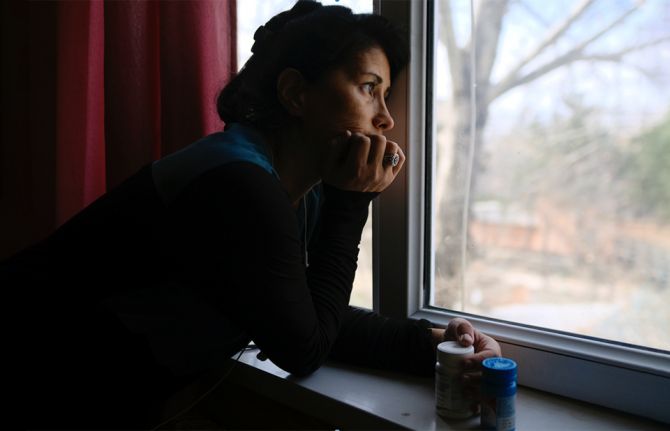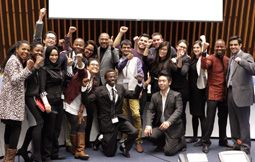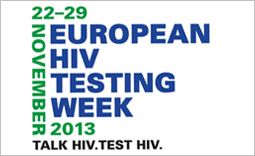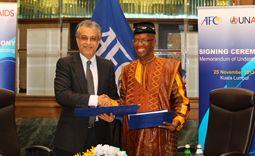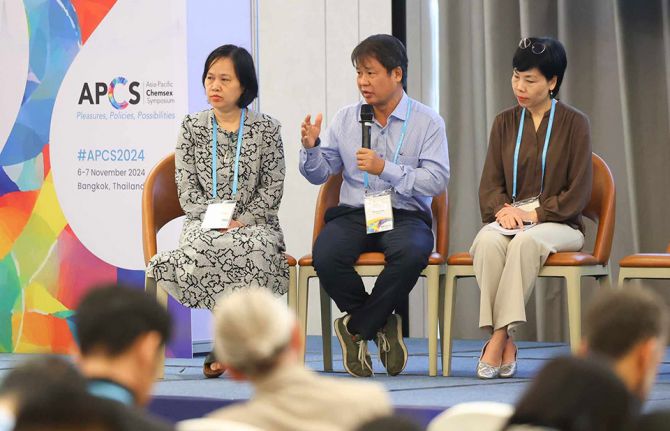
Feature Story
HRH Mette-Marit, Crown Princess of Norway joins young people to open Youth Pavilion at AIDS 2010
19 July 2010
19 July 2010 19 July 2010
UNAIDS Goodwill Ambassador HRH Mette-Marit, Crown Princess of Norway
Credit: UNAIDS/Anna Rauchenberger
UNAIDS Goodwill Ambassador HRH Mette-Marit, Crown Princess of Norway, joined UNAIDS Deputy Executive Director, Management and External Relations Branch, Ms Jan Beagle and Dr Julio Montaner, International Chair of the XVIII International AIDS Conference and President of the International AIDS Society in welcoming young participants to the Youth Pavilion at XVIII International AIDS Conference.

UNAIDS Deputy Executive Director, Management and External Relations Branch, Ms Jan Beagle
Credit: UNAIDS/Anna Rauchenberger
HRH Mette-Marit, who has made the needs of young people her primary focus as UNAIDS Goodwill Ambassador encouraged the young delegates saying, “We need to recognize youth as global citizens instrumental in understanding and driving the change that is needed in the new AIDS response... Make it happen now!”
With a message of support Ms Jan Beagle said, UNAIDS is committed to create a movement of young people as change agents for a new generation of leadership in the AIDS response.

In the coming week a series of Pavilion Talks will take place to enhance cooperation between young people and scientists, activists and other high-level stakeholders.
Credit: UNAIDS/Anna Rauchenberger
“UNAIDS is committed to empower young people, providing them space to inform our policy and programming and to inspire UNAIDS with a youth spirit,” said Ms Beagle.
The Youth Pavilion is an interactive space in the Global Village of AIDS 2010 for young people to showcase projects and performances, and meet delegates, plenary speakers and decision-makers.
The Opening Ceremony was highly interactive and included a flash mob event where young people throughout the Global Village put on YouthForce T-Shirts and moved en masse towards the Youth Pavilion.
The opening was co-chaired by the Youth Programme Working Group Co-Chairs Liping Mian (China) and Korey Anthony Chisholm (Guyana) who talked about the global HIV youth movement and introduced the youth activities during AIDS 2010 including the AIDS 2010 Youth Programme and Vienna YouthForce activities.
They also introduced the “3 HRs” campaign promote human rights, harm reduction and health resources as a framework to achieve HIV services for young people. By highlighting these “3 HRs” to policy experts and decision-makers in the coming week, young people hope to highlight their needs in the AIDS response.
Pavilion Talks
In the coming week a series of Pavilion Talks will take place to enhance cooperation between young people and scientists, activists and other high-level stakeholders. These will be designed by young people and provide space for questions and discussion. It will be opened each day by a youth rapporteur who will present the highlights of the previous day and give a brief summary of the morning plenary session.
Right Hand Content
Publications:
UNAIDS Outlook Report 2010 (pdf, 6 Mb)
UNAIDS Outcome Framework 2009-2011 (pdf, 388 Kb)
Related
 “Who will protect our young people?”
“Who will protect our young people?”

02 June 2025

Feature Story
Rights Here, Rights Now! The Global Commission on HIV and the Law
19 July 2010
19 July 2010 19 July 2010
Legal frameworks can be powerful tools for countries struggling to control their epidemics. The last three decades have given rise to contentious legal debates on HIV-related issues (e.g.: criminalization of HIV transmission; legal restrictions on needle and syringe distribution in the US, on methadone in Russia, versus legal comprehensive harm reduction in Australia). The last few years have seen an insurgence of punitive laws and practices related to drug use, HIV transmission and exposure, sex work, and same sex sexual relations. There is also a growing body of evidence on the relationship between HIV and violence against women.
There is enough variation in legal responses to HIV around the world to highlight the need to rigorously examine the impact of different legal environments on HIV outcomes and to make appropriate recommendations. According to Jeffrey O’Malley, Director of the United Nations Development Programme’s HIV/AIDS Practice, “Thirty years on, there is a huge variation from one country to the next in terms of HIV prevention results. It is increasingly clear that one of the most influential factors is the legal environment. Does the law facilitate and enable HIV prevention and care or does it stand in the way? We need to understand both cases and to promote good practice.”
Right here, right now is the time to take a hard look at how legal environments affect HIV responses. As highlighted in the Vienna Declaration, the relationship between legal environments and epidemiological trends in Eastern Europe offers an example of the ways in which legal frameworks can impact HIV epidemics. The Global Commission on HIV and the Law “provides a timely opportunity to take stock of the impact of punitive laws and practices on the lives of those most marginalized in our societies and on their access to life-saving HIV prevention and treatment services. For this reason, Australia is pleased to be supporting this endeavour. We hope other donors will follow suit,” says Mr. Murray Proctor, Australia’s AIDS Ambassador.
The Global Commission on HIV and the Law will explore the impacts of legal environments on HIV responses. Areas of inquiry may include: (1) punitive laws and practices that effectively criminalise lives (2) laws and practices that sustain violence and discrimination as lived by women (3) laws and practices that impede treatment access. The Commission’s work will take place over an 18 month period –mobilizing communities across the globe and promoting public dialogue on how to make the law work for an effective response to HIV. The findings and recommendations of the Commission will be announced in December 2011.
The Commission, which brings together eminent leaders from many walks of life and regions, will interrogate the legal environments that form the context of national HIV responses. Experts on law, public health, human rights, and HIV will support the Commissions’ work. Commissioners will assess evidence about the impact of law and law enforcement on the lives of people living with HIV and those most vulnerable to it. Regional dialogues will provide a space in which those most directly affected by HIV-related laws can share their experiences with policy and law makers. As noted by Commissioner H.E. Festus Mogae, former President of Botswana, “HIV threatens us all. HIV is a global problem and the promise of an AIDS-free generation requires bold global leadership. This Commission is an important expression of the commitment and leadership of the global community to meet the needs most vulnerable to HIV.”
Right Hand Content
External links:
Global Commission on HIV and the Law
Publications:
Information note: Global Commission on HIV and the Law 2010
Biographies of the Commissioners
Technical Advisory Group Biographies
UNAIDS Outlook Report 2010 (pdf, 6 Mb)
UNAIDS Outcome Framework 2009-2011 (pdf, 388 Kb)
Related

Feature Story
More than five million people receiving HIV treatment
19 July 2010
19 July 2010 19 July 2010World Health Organization advises earlier treatment among people with HIV
19 July 2010, Vienna - An estimated 5.2 million people in low-and middle-income countries were receiving life-saving HIV treatment at the end of 2009, according to the latest update from the World Health Organization (WHO).
WHO estimates that 1.2 million people started treatment in 2009, bringing the total number of people receiving treatment to 5.2 million, compared to 4 million at the end of 2008.
"This is the largest increase in people accessing treatment in a single year. It is an extremely encouraging development," says Dr Hiroki Nakatani, WHO Assistant Director-General for HIV, Tuberculosis, Malaria and Neglected Tropical Diseases.
At the XVIII International AIDS Conference, WHO is calling for earlier treatment for people with HIV. The objective is to begin HIV treatment before they become ill because of weakened immunity.
"Starting treatment earlier gives us an opportunity to enable people living with HIV to stay healthier and live longer,” says Dr Gottfried Hirnschall, WHO Director of HIV/AIDS.
Estimates developed through epidemiological modeling suggest that HIV-related mortality can be reduced by 20% between 2010 and 2015 if these guidelines for early treatment are broadly implemented.
Earlier treatment can prevent opportunistic infections including tuberculosis (TB), the number one killer of people with HIV. Deaths from TB can be reduced by as much as 90%, if people with both HIV and TB start treatment earlier.
The strength of a person's immune system is measured by CD4 cells. A healthy person has a CD4 count of 1000 - 1500 cells/mm3. WHO previously recommended starting HIV treatment when a person's CD4 count drops below 200 cells/mm3 but now advises starting HIV treatment at 350 cells/mm3 or below.
"In addition to saving lives, earlier treatment also has prevention benefits,” Dr Hirnschall says. “Because treatment reduces the level of virus in the body, it means HIV-positive people are less likely to pass the virus on to their partners."
WHO's treatment guidelines expand the number of people recommended for HIV treatment from an estimated 10 million to an estimated 15 million. The cost needed for HIV treatment in 2010 will be about US$ 9 billion, according to the Joint United Nations Programme on HIV/AIDS (UNAIDS).
"The investments we make today can not only save millions of lives but millions of dollars tomorrow,” said Dr Bernhard Schwartlander, Director, Evidence, Strategy and Results, UNAIDS. "People with weaker immune systems who come late for treatment require more complex and costly drugs and services than those who start treatment earlier and are healthier."
Since 2003 - which marked the launch of the historic “3 by 5” initiative to provide access to HIV treatment to 3 million people living in low- and middle-income countries by the end of 2005 - the number of people receiving HIV treatment has increased 12-fold.
At AIDS 2010, WHO is releasing the 2010 guidelines on “Antiretroviral treatment of HIV infection in adults and adolescents – public health approach”, which can be found at www.who.int/hiv.
Right Hand Content
Publications:
Fact sheet: New progress and guidance on HIV treatment
UNAIDS Outlook Report 2010 (pdf, 6 Mb)
UNAIDS Outcome Framework 2009-2011 (pdf, 388 Kb)
Related

Feature Story
A human rights-based approach to prevention: Mission impossible?
19 July 2010
19 July 2010 19 July 2010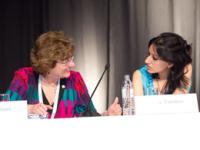 From the left: Mirta Roses; Tripti Tandon at ‘Human Rights based approach to HIV Prevention: Mission Impossible’, 18 July 2010. Credit: UNAIDS/Anna Rauchenberger
From the left: Mirta Roses; Tripti Tandon at ‘Human Rights based approach to HIV Prevention: Mission Impossible’, 18 July 2010. Credit: UNAIDS/Anna RauchenbergerThe Global Village of AIDS 2010 was the setting of a UNAIDS satellite session on HIV prevention and human rights. Participants discussed how evidence-informed and rights-based laws, policies and programmes can be scaled-up in support of a ‘prevention revolution’ to break the trajectory of the epidemic.
Panelists highlighted some enduring failures to recognise and protect human rights in the context of prevention, as well as examples of successful prevention responses employing a human rights-based approach. Notwithstanding some key challenges, the unanimous view of the diverse expert panel was that such an approach to prevention is not mission impossible if current opportunities to put human rights at the centre of the prevention revolution are seized. Indeed, it was felt that there can be no ‘revolution’ of the prevention response without human rights.
The event, which used a talk show format to encourage open dialogue and audience participation, was moderated by Dr Mandeep Dhaliwal, Cluster Leader of Human Rights, Gender and Sexual Diversity at the United Nations Development Programme (UNDP).
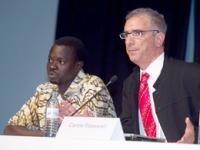 From the left: Daouda Diouf; Carlos Passarelli at ‘Human Rights based approach to HIV Prevention: Mission Impossible’, 18 July 2010.
From the left: Daouda Diouf; Carlos Passarelli at ‘Human Rights based approach to HIV Prevention: Mission Impossible’, 18 July 2010.Credit: UNAIDS/Anna Rauchenberger
Six panelists from a range of perspectives and experiences including governments, civil society and the United Nations, presented their views on whether human rights have been used effectively to drive action towards universal access to HIV prevention, treatment, care and support.
Mr Carlos Passarelli of the Government of Brazil spoke about his country’s experience and success in HIV prevention which, he said would not have occurred without a human rights-based approach.
Speaking from first-hand knowledge, Ms Olimbi Hoxhaj of the Albanian Network of People Living with HIV, told the session about her experience in using arguments based on human rights and equality in order to get her children into school and gain access to treatment for those who were HIV-positive.
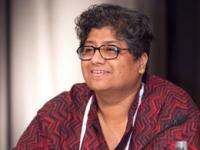 Meena Seshu at ‘Human Rights based approach to HIV Prevention: Mission Impossible’, 18 July 2010.
Meena Seshu at ‘Human Rights based approach to HIV Prevention: Mission Impossible’, 18 July 2010.Credit: UNAIDS/Anna Rauchenberger
Ms Meena Seshu described how female, male and transgender sex workers’ access to health and HIV prevention was being undermined by the fact that their rights to the highest standards of health and to safe working conditions were not being protected. Ms Seshu is a member of SANGRAM, an Indian grass-roots peer education organisation partnering with women in sex work to promote their rights and encourage them to be agents of change.
Other panelists included Tripti Tandon from the Lawyers’ Collective in India, Dr Mirta Roses, Director of the Pan American Health Organisation, PAHO and Daouda Diouf of the international NGO Enda Sante.
A human rights-based approach to mitigating the extent and effects of the AIDS epidemic, and promoting universal access to HIV services is seen as critical. Although there has been notable progress in many areas, punitive laws, policies, practices and stigma and discrimination continue to undermine the achievement of universal access targets including access to prevention for those who need it – and the Millennium Development Goals.
Panelists emphasized that a prevention revolution must be grounded in human rights if there is to be a significant and sustainable improvement in the prevention response. In summing up the discussion at the Satellite, Mandeep Dhaliwal noted that the experiences shared confirmed that success in prevention can only be achieved in legal and social environments that advance human rights, gender equality and social justice.
She emphasised the importance of the UNAIDS High Level Commission on HIV Prevention putting the issue of human rights – for so long poorly understood and neglected in the prevention response - at the front and centre of its work. “After all, what good is a prevention revolution without human rights?”
Right Hand Content


Cosponsors:
United Nations Development Programme (UNDP)
Partners:
Pan American Health Organisation (PAHO)
Feature stories:
Landmark forum in China to champion rights-based approach to HIV (06 July 2010)
UNAIDS addresses UN Human Rights Council on the impact of punitive laws on HIV (10 June 2010)
Publications:
UNAIDS Outlook Report 2010 (pdf, 6 Mb)
UNAIDS Outcome Framework 2009-2011 (pdf, 388 Kb)
Related

Feature Story
AIDS 2010 begins in Vienna with call for Treatment 2.0
19 July 2010
19 July 2010 19 July 2010 Opening ceremony of AIDS 2010. Credit: UNAIDS/Heimo Aga
Opening ceremony of AIDS 2010. Credit: UNAIDS/Heimo AgaThe XVIII International AIDS Conference opened on Sunday 18 July in the city of Vienna. With open arms, Austria has welcomed an estimated 20,000 delegates from all over the world who will spend the next week taking part in conference sessions and satellite meetings under the theme “Rights Here, Right Now” selected to emphasize the critical connection between human rights and HIV.
The opening ceremony began with a video message form Secretary-General Ban-Ki Moon reiterating UNAIDS’ new vision for the AIDS response: zero new infections, zero discrimination and zero AIDS-related deaths.
The Executive Director of UNAIDS, Mr Michel Sidibé, in his speech to delegates, stressed that this conference comes at a defining moment in the AIDS response. He focused his remarks on the transformation that is required to break the trajectory of the epidemic.
Mr Sidibé spoke on the urgency for a new approach to antiretroviral treatment, and introduced Treatment 2.0.
“Treatment 2.0 radically simplifies treatment to maximize the number of people who can benefit. This will save more money. But in the end, we will only be measured by the number of lives we save,” he said.
This new treatment model is also relevant in the European context said John Dalli, European Union Commissioner of Health and Consumer Policy. Mr Dalli stressed that there are major treatment inequalities across the European Union, with cost of treatment differing from country to country and treatment stocks sometimes running out. He said now is the time to turn targets into tangible results.
A message of commitment to activism was delivered by the singer and activist Ms Annie Lennox, who was recently appointed UNAIDS International Goodwill ambassador.
“HIV should not be stigmatized, it should be normalized” said Ms Lennox “There must be no more discrimination of HIV.”
Remarks were also made by Ms Brigitte Schmied, president of the Austrian AIDS Society and local chairperson of the conference, as well as by Dr Julio Montaner, the president of the International AIDS Society, who echoed Mr Sidibé’s call for Treatment 2.0. “Treatment 2.0 is the single most important thing coming out of this meeting”, said Dr Montaner. “Let’s rally behind it, and let’s rally behind universal access.”
The community welcome was given by Vladimir Zhovtiak from Ukraine and Sasha Volgina from the Russian Federation. They delivered a joint address on the urgency of the HIV epidemic in the eastern Europe and central Asian region. “The epidemic in our region is the fastest growing epidemic in the world. We are dying less, but we are dying faster”, said Ms Volgina.
Twenty-two year old Rachel Arinii, a regional member of the Global Youth Coalition on HIV/AIDS from Indonesia, delivered inspiring remarks representing all young people at AIDS 2010. “Young people are too young to die. We call on our leaders to provide evidence-based sexuality education in and out of schools,” said Ms Arinii.
The Federal President of Austria, Mr Heinz Fisher, closed the ceremony where he welcomed the delegates to the conference as well as the country.
AIDS 2010 is convened by the International AIDS Society in partnership with a number of international, regional and local partners. These include local scientific leadership, the City of Vienna and the Government of Austria, Aids Hilfe Wien, Austrian AIDS Society, East European & Central Asian Union of PLWH (ECUO), European AIDS Clinical Society (EACS) and the European Commission.
International partners for AIDS 2010 include Joint United Nations Programme on HIV/AIDS (UNAIDS), including its co-sponsors, the World Health Organization (WHO) and the United Nations Office on Drugs and Crime (UNODC), International Council of AIDS Service Organizations (ICASO), Global Network of People Living with HIV/AIDS(GNP+)/International Community of Women Living with HIV/AIDS (ICW), World YWCA and Caribbean Vulnerable Communities Coalition (CVC).
AIDS 2010, as the conference is widely known, is the premier gathering for people working in the field of HIV, as well as policy makers, people living with HIV and other individuals committed to ending the epidemic. The event, the largest AIDS conference in the world, is held every two years.
Located at the heart of Europe, the conference will put the spotlight on HIV epidemics in Eastern European and Central Asia, the only region where HIV prevalence clearly remains on the rise. The conference programme will present new scientific knowledge and offer opportunities for structured dialogue on the major issues facing the global response to HIV. Other related activities, including the Global Village with its cultural program, exhibitions and affiliated events will open up space for dialogue and reflection.
The conference runs until the 23 July, 2010.
Right Hand Content
Speeches:
Speech by UNAIDS Executive Director 18 July 2010
Multimedia:
Publications:
UNAIDS Outlook Report 2010 (pdf, 6 Mb)
UNAIDS Outcome Framework 2009-2011 (pdf, 388 Kb)
Related
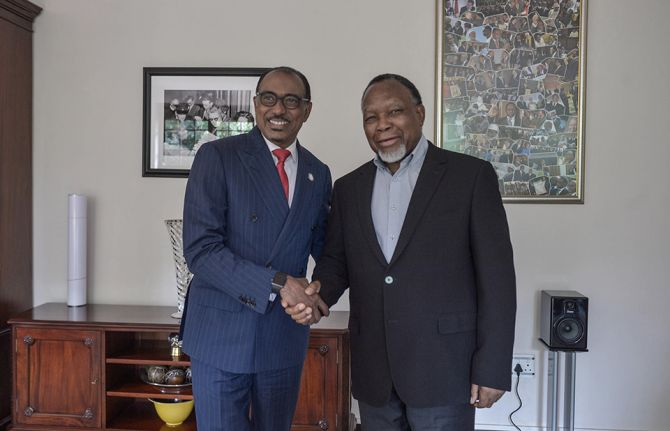 Keeping up the momentum in the global AIDS response
Keeping up the momentum in the global AIDS response

24 April 2019
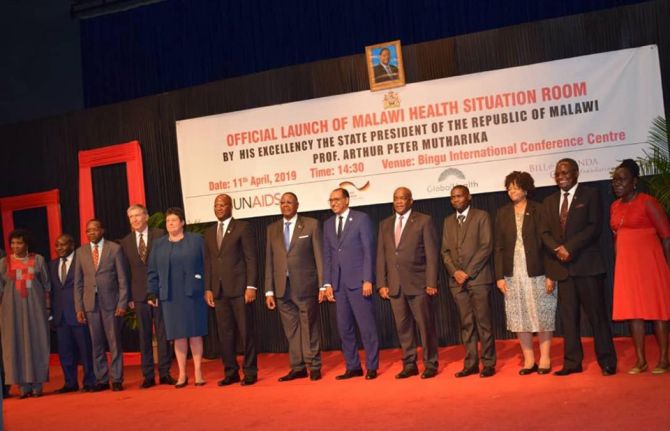 Malawi launches its health situation room
Malawi launches its health situation room

12 April 2019
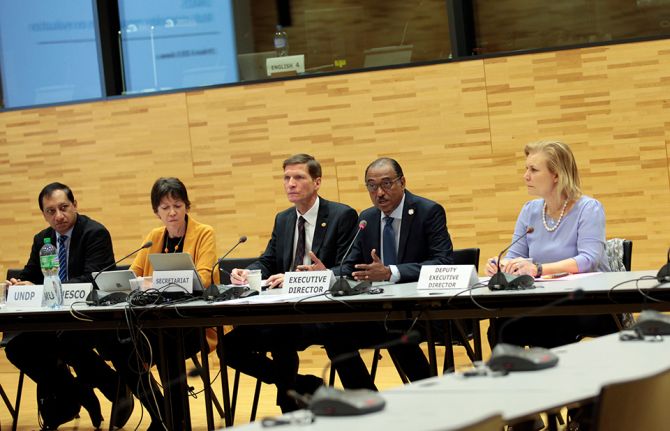 Learning lessons on evaluation
Learning lessons on evaluation

02 April 2019

Feature Story
ICASO satellite reviews targets and strategies for universal access
19 July 2010
19 July 2010 19 July 2010 From the left: Maria Antoniela Alcalde, Paul de Lay, UNAIDS Deputy Executive Director; Olayide Akanni; Kieran Daly, Elena Grigoryeva at the‘ICASO satellite on Universal Access’, Session Room 7 at AIDS 2010, Vienna, Austria on 19 July 2010
From the left: Maria Antoniela Alcalde, Paul de Lay, UNAIDS Deputy Executive Director; Olayide Akanni; Kieran Daly, Elena Grigoryeva at the‘ICASO satellite on Universal Access’, Session Room 7 at AIDS 2010, Vienna, Austria on 19 July 2010Credit: UNAIDS/Anna Rauchenberger
At a satellite session on universal access to HIV prevention, treatment, care and support, panelists discussed target setting and review process to date, drawing on community analysis from countries over the last few years. The session aimed to start a debate on how, in many countries, genuine targets for universal access (UA) are not being set, especially for populations at higher risk of HIV infection.
The session, titled 'Fool me Once, Shame on you... Fool me twice, Shame on me: Key population leadership for Universal Access', was organised by the International Council of AIDS Service Organizations (ICASO).
Panelists included UNAIDS Deputy Executive Director, Programme, Dr Paul De Lay, who discussed UNAIDS' analysis of the current situation, particularly at the country level, including target setting for key populations.
“Significant strides have been made since 2006 in achieving universal access, such as a 12-fold increase in access to services for prevention of mother-to-child HIV transmission, but by the end of 2010, only one-third of countries will have reached the UA targets they set,” said Dr De Lay.
“National targets need to be set that get at the heart of the issues facing vulnerable and key populations,” he added.
Talking about UNAIDS' commitment to providing universal access, Dr De Lay said, "It may be tempting to blame someone for not reaching universal access. But we need to keep ourselves focused on what we need to do, rather than what we did not yet do."
In 2006 governments committed, in the form of a Political Declaration on HIV/AIDS, to providing universal access to HIV prevention, treatment, care and support services to all those in need by 2010. During its recent Programme Coordinating Board meeting, UNAIDS proposed to call on the General Assembly to extend the commitment to universal access to 2015, and to report back on its progress in June 2016. This was not without reason.
Over the past years many countries have brought in new legislation protecting the rights of key populations, particularly those of men who have sex with men and transgender communities. While on the other hand, there still remain several others that have new legislation, or are planning new legislation, that will drive key populations further away from services.
"As you see a polarization of conservative and liberal values in individual countries, we see this playing out on the world stage," Dr De Lay explained.
In such a scenario, there is a need to revitalize monitoring to assist countries and set targets that will reduce sexual transmission, empower men who have sex with men, sex workers and transgender people to protect themselves, protect drug users from becoming infected and remove punitive laws, policies and practices, stigma and discrimination.
Right Hand Content
Feature stories:
Countries urged to review progress made in achieving national AIDS targets (15 February 2010)
UNAIDS praises Viet Nam’s efforts to reach universal access (11 May 2009)
External links:
International Council of AIDS Service Organizations
Publications:
Universal Access to HIV Prevention, Treatment, Care and Support - Road map and next steps for 2010 and beyond
UNAIDS Outlook Report 2010 (pdf, 6 Mb)
UNAIDS Outcome Framework 2009-2011 (pdf, 388 Kb)
Related

Feature Story
Town hall on reshaping the future of the AIDS response sets the tone for International AIDS Conference
18 July 2010
18 July 2010 18 July 2010Ahead of the official opening of the XVIII International AIDS Conference, a town hall event saw the coming together of influential leaders in the AIDS response to share their insights of what the future of HIV prevention and treatment must look like if the goal of zero new infections and zero AIDS deaths is to be reached by 2015.
Organized by UNAIDS and the International AIDS Society (IAS), the town hall event “Towards a paradigm shift in HIV treatment and prevention” engaged dynamic leaders Kgalema Motlanthe, Deputy President of South Africa, Michel Sidibé, Executive Director of UNAIDS, and Julio Montaner, President of the International AIDS Society, in a discussion on HIV prevention, treatment, investments and human rights.
The Deputy President of South Africa underscored his country’s commitment to the HIV response despite the financial crisis that threaten gains made, such as increased access to treatment and for the first time declining rates of new HIV infections among young people.
“Even as the world experiences an economic downturn, investments in the fight against HIV must not be the soft target for austerity measures,” said Mr. Motlanthe. “South Africa has prioritized the AIDS response as an investment in life, hope, health systems, and human development with the view to improve the quality of life.”
By taking AIDS further out of isolation, the Deputy President underscored that his country could see significant reductions in maternal and infant deaths. He called on all countries to renew the commitment to universal access by bringing it in line with the MDG timeframe of 2015.
We need drugs that are cheaper, easier to administer, and diagnostics that are simpler to use. Treatment for prevention is not just a dream. It is possible if we share the responsibility.
UNAIDS Executive Director Michel Sidibé
Following Mr. Motlanthe’s speech, Mr. Sidibé spoke on Treatment 2.0, a radically simplified treatment platform that UNAIDS believes could have secondary benefits for prevention. “Let’s be realistic: Costs for treatment are rising. People are starting to lose hope and we need to bring the hope back,” said Mr. Sidibé. “We need drugs that are cheaper, easier to administer, and diagnostics that are simpler to use. Treatment for prevention is not just a dream. It is possible if we share the responsibility.”
Together with Treatment 2.0, Mr. Sidibé said a ‘prevention revolution’ is required to break the trajectory of the epidemic. He said this revolution will not happen without “prevention diplomacy” with the leaders like those who were assembled at the town hall.
Julio Montaner, IAS President, shared his optimism for the merging of prevention and treatment efforts and said that by treating more people, new HIV infections can be reduced.

Following the opening segment, the town hall’s host, James Chau, news anchor with China Central Television (CCTV) and a UNAIDS National Goodwill Ambassador for China, engaged the audience in an interactive panel discussion on prevention and treatment with Barbara Lee, US Congresswoman, 9th District of California, Rolake Odetoyinbo, Executive Director of Positive Action for Treatment Access, Mphu Ramatlapeng, Minister of Health and Social Welfare of Lesotho, and Claudia Ahumada of the World AIDS Campaign.
The panellists shared their personal perspectives of the challenges and progress in implementing HIV prevention, treatment, care and support services as well as ensuring human rights.
The town hall featured a special appearance of UNAIDS International Goodwill Ambassador Annie Lennox who spoke passionately on why she is engaged in the response.
“I don’t want to see any mother die of a preventable disease. Why should that be?” she asked the audience. “HIV is the leading killer of women of reproductive age globally. Why doesn’t the world respond to this? I will keep campaigning until we see the kind of changes Michel Sidibé is talking about.”
Ms Lennox closed the event by asking the leaders and activists who shared the stage and those in the audience to “recommit to the response and take it further.”
Right Hand Content
Multimedia:
View webcast of the Town hall event
Publications:
UNAIDS Outlook Report 2010 (pdf, 6 Mb)
UNAIDS Outcome Framework 2009-2011 (pdf, 388 Kb)

Feature Story
Dialogue on new generation leadership and youth mentoring at AIDS 2010
17 July 2010
17 July 2010 17 July 2010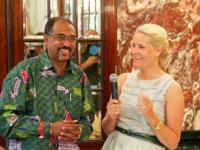 HRH the Crown Princess of Norway and UNAIDS Executive Director Mr Michel Sidibé, Vienna, 17 July 2010. Credit: UNAIDS/Heimo Aga
HRH the Crown Princess of Norway and UNAIDS Executive Director Mr Michel Sidibé, Vienna, 17 July 2010. Credit: UNAIDS/Heimo Aga Young leaders from around the world joined HRH the Crown Princess of Norway and UNAIDS Executive Director Mr Michel Sidibé and others to exchange experiences on leadership in the AIDS response during a formal and an informal session on 17 July 2010 at AIDS 2010.
Bringing together current leaders with an emerging generation of young leaders, the afternoon sessions were an opportunity to share experiences and exchange ideas on the concept of “new generation leadership” between established and young leaders and identify the potential opportunities.
New Generation Leadership
Based on recommendations of young leaders during the Young Leaders Summit in Oslo, Norway in June 2009, new generation leadership hopes to increase the participation of young people in policy-making and help foster a new generation of leadership.
UNAIDS Goodwill Ambassador, Her Royal Highness Crown Princess Mette-Marit of Norway is committed to supporting the issue of new generation leadership in the AIDS response. Noting the importance of this approach, HRH Mette-Marit said, “In my role with UNAIDS I consider helping to strengthen young leadership to be my most important task.”
“We are at a crossroads and we need young people to be at the forefront of our efforts. Join me to pave the way for new leaders," HRH Princess Mette-Marit added.
HIV Youth Mentorship Hub
The UNAIDS Executive Director, calling for “young leaders of today, not for tomorrow,” also launched the concept of an HIV Youth Mentorship Hub. The Hub is envisaged as a mechanism to strengthen the visibility and effectiveness of youth leadership in the global AIDS response. Through its online community e-platform, AIDSspace, the Joint Programme hopes to provide a structured opportunity to connect established leaders in the HIV response with emerging young leaders. The young leaders and their respective mentors would be able to interact and discuss issues related to HIV prevention, treatment, care and support.
The HIV Youth Mentorship Hub also aims to make a repository of knowledge and skills in youth leadership available. This will enable young people to shape the implementation of effective HIV programmes and to foster a youth movement to reduce new HIV infection among young people.
Support for youth leadership is a key priority for UNAIDS. According to its Outcome Framework 2010-2011, the Joint Programme strives towards "Empowering young people to protect themselves from HIV" as one of its ten priority areas. The New Generation Leadership programme and HIV Youth Mentorship Hubs are steps in this direction.
As Paddy Masembe, a delegate representing the Uganda Network of Young People Living with HIV, pointed out at today’s event, the youth voice is critical, “People say young people are too young to discuss sex, but we are too young to die!”
Right Hand Content
Feature stories:
aids2031 2009 Young Leaders Summit (25 June 2009)
Publications:
UNAIDS Outlook Report 2010 (pdf, 6 Mb)
UNAIDS Outcome Framework 2009-2011 (pdf, 388 Kb)
Related
 “Who will protect our young people?”
“Who will protect our young people?”

02 June 2025

Feature Story
Young people: Now make it happen!
17 July 2010
17 July 2010 17 July 2010 UNAIDS Executive Director, centre, on stage at the closing of the Youth Pre-Conference.
UNAIDS Executive Director, centre, on stage at the closing of the Youth Pre-Conference. Credit: UNAIDS/Heimo Aga
UNAIDS Executive Director Mr Michel Sidibé has highlighted how young people are leading the prevention revolution.
Mr Sidibé was speaking at the reception of the closing ceremony of the Youth Pre-Conference which took place 16 July 2010.
Referring to the data that shows that HIV prevalence has dropped 25% among youth in 15 of the highest burden countries, Mr Sidibé noted “young people are leading the prevention revolution… my dear young friends, never forget that your generation is different—and you are making the difference!”
He called for better access to comprehensive information on sex and sexuality and sexual and reproductive health services; more investment in young people within national development goals to ensure an HIV-free generation and better data disaggregated by age and gender so responses can be tailored.
Mr Sidibé also highlighted the importance of human rights and gender equity saying no one should be ashamed or stigmatised by who they are or who they love.
The three day event for young people attending AIDS 2010 consisted of information sessions and skills-building workshops on HIV issues ranging from scientific knowledge to effective political advocacy. The event which began on 14 July and covered a range of workshops for young delegates to get the most out of the forthcoming XVIII International AIDS conference which begins on 18 July. Delegates had a chance to familiarize themselves with logistics, hone their advocacy and networking skills and attend “share your knowledge” sessions with peers.
Young people are high on the agenda at the forthcoming AIDS 2010.
Call for framework of human rights, harm reduction and health resources
Following a worldwide electronic consultation conducted by the Vienna YouthForce Advocacy Sub-committee, young people will run a campaign at AIDS 2010 to promote human rights, harm reduction and health resources as a framework to achieve HIV services for young people—Now make it happen!.
By highlighting these “3 HRs” to policy experts and decision makers in the coming week they hope to highlight young people’s needs in the AIDS response.
Recent analysis shows that when young people are empowered, they are taking responsibility for their behaviour and making a difference in the AIDS response.
Trends in HIV prevention and young people
Young people have shown that they can be change agents in the prevention revolution. According to UNAIDS Outlook Report published 13 July 2010, HIV prevalence has decreased among young people in more than 16 of the 21 countries most severely affected by the epidemic.
Of these, 12 have seen HIV prevalence among young people drop by more than 25%. Countries include Kenya, Ethiopia, Malawi, Namibia, Zimbabwe, Botswana, and Côte d’Ivoire. Young people are leading the revolution by adopting safer behaviours—they are choosing to have sex later, have fewer partners and are using condoms.
UNAIDS has made empowering young people to protect themselves from HIV a priority area. It calls on countries to implement a comprehensive set of programmes that put young people’s leadership at the centre of national responses, and empower young people to prevent sexual and other transmission of HIV infection among their peers.
Youth Pre-Conference
The Youth Pre-Conference was jointly organized by the AIDS 2010 Youth Programme and Vienna YouthForce (VYF), a global platform of international, regional and local youth organizations that focus on HIV as well as on sexual and reproductive health and rights.
The event received support from the UN Population Fund (UNFPA). UNFPA is the UNAIDS Cosponsor which leads on youth and HIV issues. It is committed to promoting meaningful youth participation in international events and has provided considerable support to young people during the previous three international AIDS conferences in Bangkok 2002, Toronto 2006 and Mexico 2008.
The eighteenth International AIDS Conference will begin on Sunday in Vienna. These events, which take place every two years, are the biggest gatherings of scientific, community and government leaders, UN agencies, donors and the general public committed to finding solutions to end the spread of HIV and provide access to services.
Right Hand Content


Publications:
UNAIDS Outlook Report 2010 (pdf, 6 Mb)
UNAIDS Outcome Framework 2009-2011 (pdf, 388 Kb)
Related

Feature Story
UNAIDS calls for protection of human rights of men who have sex with men and sexual minorities at pre-conference forum
17 July 2010
17 July 2010 17 July 2010 UNAIDS Executive Director Michel Sidibé affreses MSMGF, 17 July 2010. Credit: UNAIDS&Heimo Aga
UNAIDS Executive Director Michel Sidibé affreses MSMGF, 17 July 2010. Credit: UNAIDS&Heimo Aga“The human rights of men who have sex with men and other sexual minorities must be fully protected and respected if universal access to HIV services is to be achieved,” said UNAIDS Executive Director Mr Michel Sidibé.
“All people should have equal access HIV prevention, treatment and care services in their countries regardless of sexual orientation,” Mr Sidibé continued.
The Executive Director was speaking during a keynote address to the Global Forum on MSM & HIV (MSMGF), held ahead of the International AIDS Conference in Vienna.
Around 80 countries criminalize same sex behaviour and along with social stigma in many other parts of the world this creates obstacles to HIV prevention. Where men may be afraid to or embarrassed about disclosing their sexual activity, they may also be deterred from finding out what they need to know to reduce their risk or to buy condoms. UNAIDS supports efforts to enforce anti-discrimination legislation, provide legal aid services and promote campaigns that address homophobia.
HIV and men who have sex with men
Unprotected sex between men accounts for between 5% and 10% of global HIV infections. It is the predominant mode of HIV transmission in much of the developed world. Currently, access to prevention, treatment, care and support services is limited compared with the share of the burden faced by men who have sex with men who are 19 times more likely to become infected with HIV than the general population.
For example while men who have sex with men account for the largest share of HIV infections in Latin America, only a small fraction of spending in the region supports prevention programmes focused on this population.
By ensuring that they are empowered to access and deliver comprehensive and appropriate packages of HIV services and by ensuring that law enforcement agencies and the judicial system protect their rights, men who have sex with men, can protect themselves from HIV and access treatment.
Global Forum on MSM & HIV: Be Heard
The “Be Heard” event explored the challenges and best practices in achieving universal access to HIV-related prevention, care, treatment, and support services for sexual minority communities worldwide. It brought together around 450 human rights advocates, artists, researchers, public health officials, multi-lateral organizations, and global donors for a day of workshops, skills building, information exchange, and networking sessions.
Sessions at the event addressed a range of issues, from HIV prevention, to funding for MSM projects, to engaging MSM living with HIV in the response to HIV, and empowering MSM in Africa.
First convened at the 2006 International AIDS Conference in Toronto, the MSMGF was established in response to a shared concern that current HIV strategies and responses do not adequately address the needs of men who have sex with men.
Right Hand Content


External links:
Publicaciones:
PERSPECTIVAS del ONUSIDA 2010 (pdf, 6 Mb) (en inglés)
Marco de resultados de ONUSIDA, 2009-2011 (pdf, 388 Kb)





